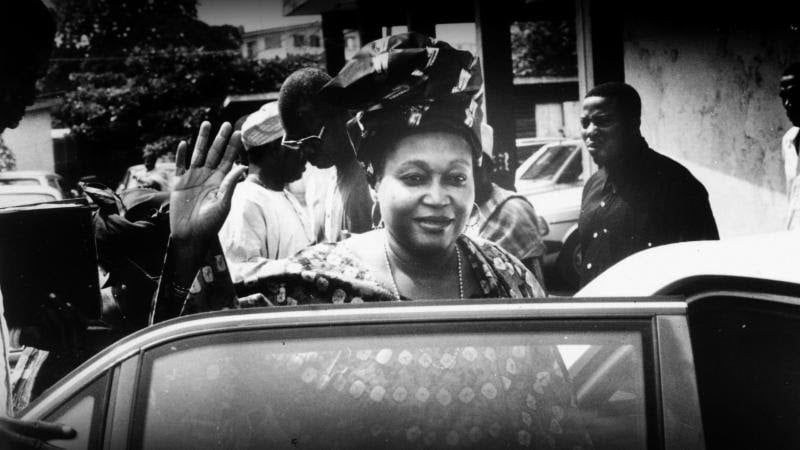In 1993, Nigeria elected M.K.O. Abiola as president in a historic vote that promised to end years of military dictatorship. Shortly after the election, however, Abiola was imprisoned as another military regime assumed power, and his wife, Kudirat, took over the leadership of the pro-democracy movement, organising strikes and marches, and winning international attention for the Nigerian struggle. Because of this work, she was assassinated in 1996.
Eighteen years after that death, a film in honour of Kudirat Abiola will be screened on September 25 at the Africa Film festival, which runs until October 1 and will also feature Kunle Afolayan’s October 1.
Titled The Supreme Price and directed by Joanna Lipper, the film elegantly tells the story through the eyes of Hafsat Abiola, who was on the verge of graduating from Harvard when her mother was murdered (her father died in prison two years later).
Determined not to let her parents’ ideals die with them, Hafsat has dedicated her adult life to continuing their fight for democracy. Returning to Nigeria after years abroad, she is at the forefront of a progressive movement to empower women and dismantle the patriarchal structure of Nigerian society.
Advertisement
The Supreme Price has been described as an unprecedented and personal look at the Abiola story, which is still unfolding.
Advertisement
It received the Gucci Tribeca Spotlighting Women Documentary Award and launched Gucci’s Chime for Change Women’s Empowerment Campaign at TED2013.
Lipper, its’ director, is an award-winning filmmaker. Her work as a documentary filmmaker has been supported by the MacArthur Foundation, Ford Foundation, ITVS, Britdoc Foundation, the Tribeca Gucci Documentary Fund and Chicken & Egg Pictures.
A lecturer at Harvard University where she teaches Using Film for Social Change in the Department of African and African American Studies, Lipper is the author of the nationally-acclaimed book Growing Up Fast, which documented the lives of teen parents in Pittsfield, MA. The national impact of this book and a related documentary was the subject of a segment of The Jane Pauley Show (NBC).
Her photography has been published and exhibited in the US and overseas.
Advertisement
Indiewire described i as a “deeply profound and beautiful experience, and an integral film to watch”.
Of the documentary, The New York Times wrote: “aking a long historical view of a troubled country struggling to emerge from a military dictatorship is Joanna Lipper’s documentary ‘The Supreme Price’, about Nigeria’s female-directed democracy movement.
“After a military coup in 1993, M. K.O Abiola, a pro-democracy leader who was considered the victor in aborted presidential election that year but never took office, was imprisoned in 1994. Four years later he died under suspicious circumstances.
“After his imprisonment, his fearless, eloquent wife, Kudirat, took over the movement’s leadership, but she was assassinated in 1996. The history is told through the eyes of their daughter Hafsat Abiola-Costello, a Harvard-educated crusader for human rights and democracy who now leads a movement to dismantle the country’s patriarchal structure.
Advertisement
“Some of the best documentaries tell inspiring stories of people overcoming the unthinkable… With an uptick in kidnappings and killings, the situation in Nigeria is looking bleak. How exactly did the country get to such a state? Joanna Lipper’s film looks at the pro-democracy movement in the corrupt African nation but also gives a helpful tutorial on Nigerian politics.”
Advertisement
Huffington Post described it as one of 10 films all human rights activists should see.
Asked by New York Film Society what her inspiration was, Lipper said she had a particular interest in films about complex multifaceted women who defy expectations and create their own destinies rather than surrendering to circumstances.
Advertisement
“I first encountered Hafsat Abiola over a decade ago at an event organised to raise awareness of her endeavour to build Kudirat Initiative for Democracy (KIND),” she said.
“Hafsat created this organisation intending to honour her mother’s legacy by educating and empowering women in Nigeria with the goal of increasing their participation in politics and inspiring them to pursue leadership roles. When Hafsat stood up and told her family’s tragic story, I was impressed by the way she channelled her rage and mourning into determination, tenacity and activism, calling upon knowledge, integrity, courage and persistence to oppose corruption and senseless violence. Instead of being a victim of circumstances, Hafsat became an agent of change.
Advertisement
She explained that while making the film, she saw the opportunity to tell the story of Nigeria’s political evolution from independence in 1960 to the present, with an emphasis on women’s roles, sacrifices and vital contributions.
“Two of my absolute favorite films are Bernardo Bertolucci’s The Last Emperor and Hiroshima Mon Amour, directed by Alain Resnais. I greatly admire the way those two films situate individual characters against sweeping historical and global contexts at pivotal points of crisis, trauma, political upheaval and transition.
“As I made this documentary and studied the archival footage along with my footage of contemporary Nigeria, I saw clearly how the Abiola family’s story connects inextricably to Nigeria’s ongoing struggle for true democracy, transparent and accountable governance and protection of human rights.
And as to what people who would watch it at the festival would take away, it is the urgent immediate need for global solidarity when it comes to empowering women to be leaders in local communities and on the state and federal levels. This requires more equal opportunities for women to enter politics and occupy elected positions of power and influence not just in Nigeria – but also in countries like the United States where women are underrepresented at every level of the political system.”
Towards realising that, she said partnerships had been established with Vital Voices, Women for Women International and Gucci’s Chime for Change, while audience members who are inspired to participate and make a difference after seeing the film could donate to these organisations, which are dedicated to empowering women and girls.
Add a comment








